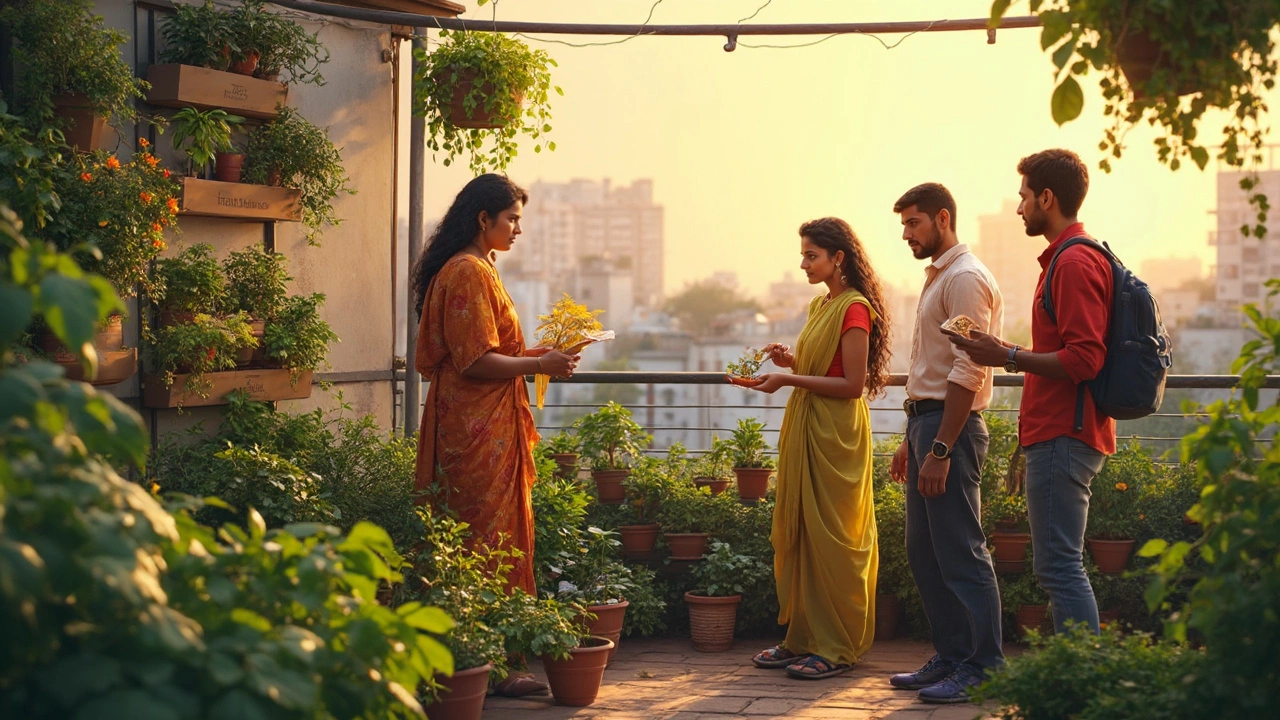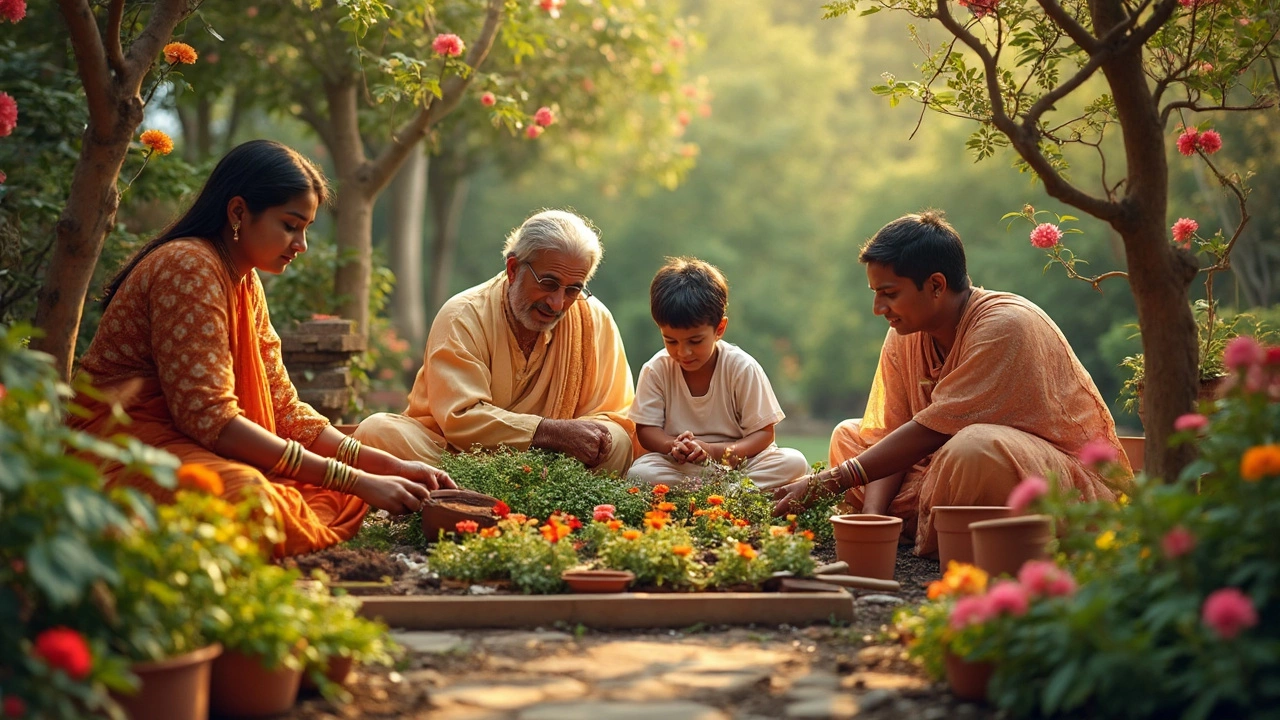Most people don’t realize that gardening isn’t just about getting your hands dirty. There’s a whole language behind those green thumbs—words that immediately boost your credibility at a dinner party or make you sound like a pro at the local flower show. Ever caught someone tossing around 'horticulture' or 'permaculture' and felt a bit out of the loop? Some of these words trace back hundreds of years, while others are just clever ways to sound fancy when talking about weeding the borders. Picking a 'smart word' for gardening does more than fluff up your vocabulary; it tells a story of tradition, science, and culture rolled into one little seed of a term.
Breaking Down the 'Smart Words' for Gardening
If you’ve only used the word ‘gardening,’ you’re not wrong—but there’s a world of alternatives lurking in plant nurseries, university courses, and behind-the-scenes at botanical gardens. Probably the most common smart word is horticulture. It’s not just about clipping the grass. Horticulture actually means the art and science of growing fruits, vegetables, flowers, and ornamental plants. The word comes from the Latin ‘hortus’ (garden) and ‘cultura’ (cultivation). With horticulture, you’re not just making things look nice; you’re understanding how they grow, what makes them thrive, and how humans have tinkered with the landscape for food and beauty for thousands of years. The Royal Horticultural Society (RHS), founded in 1804, is so influential that every spring, people in Manchester and beyond schedule their calendar to visit their flower shows.
Then there’s 'botany', which sounds like you’re about to break out a microscope. This is the scientific study of plants—including their structure, properties, and biochemical processes. Botanists can spend months learning the names of native plants, how they interact with insects, and why some seeds seem to refuse every trick in the book yet suddenly sprout after a downpour. If you use botany in a conversation, expect questions about Latin names—and maybe a request to name that scraggly bush down the street.
'Landscaping' is another biggie, but don’t get it mixed up with simple gardening tasks. Landscaping takes in the design, planning, and construction of outdoor spaces. It’s about visual impact—patterns, colour palettes, textures—and sometimes heavy-duty machinery. The world’s biggest landscaping projects range from global icons like the gardens of Versailles to vertical gardens in modern city centres. Britain itself spends billions annually on landscaping services, especially with younger homeowners aiming to increase property values by making their yards look straight out of a magazine.
'Permaculture'—now that's a conversation starter, especially among the eco-conscious crowd. It refers to a system where your garden mimics natural ecosystems. People who practice permaculture aim for sustainability: compost heaps, rainwater harvesting, and edible gardens that do more than just look good. The term, coined by Australians Bill Mollison and David Holmgren in the 1970s, brings everyone from PhD students to city gardeners together for talks, workshops, and hands-on lessons. Manchester’s Hulme Community Garden Centre is a perfect living example of permaculture principles—come hungry, you’ll leave with both ideas and maybe a homegrown apple.
Beyond those, terms like 'arboriculture' (tree care), 'floriculture' (flower growing), and even 'viticulture' (grapevine science) show up in books, college courses, and gardening magazines. Each taps into a different corner of plant life. Knowing these words lets you pinpoint exactly what you’re doing—no more calling yourself a ‘gardener’ if you’re pruning grapevines like a vintner in Bordeaux.
Why Words Matter: From Green Thumb to Garden Guru
Language isn’t just for sounding clever at the pub. The words you use genuinely shift how you see the garden out the window. Call it ‘horticulture’ and suddenly you’re part of a tradition reaching back to Roman villa gardens. Talk about ‘landscaping’ and you’re taking in design principles taught in art colleges around Europe. Better language means clearer thinking: if someone asks what you’re up to and you say ‘I’m doing a spot of permaculture,’ expect them to look at your compost heap with newfound respect.
But there’s more. The right word gets you further with professionals. Looking for a job at Kew Gardens? Understanding the difference between horticulture (practical growing) and botany (theory of plants) is what employers want. Use ‘floriculture’ when searching for a flower-growing course, not just ‘gardening.’ Universities and colleges in the UK have degrees specifically in horticulture and botany, covering everything from plant physiology to business management. According to UCAS, horticulture courses saw a jump in applications in 2024, with more students appreciating how green skills intersect with climate science, technology, and even food security.
Even in everyday chat, picking a precise term can steer the conversation. Ask for landscape advice at the local garden centre and you’ll get tips on patio layouts and evergreen hedges. Talk about permaculture at a community meeting and suddenly everyone’s swapping ideas about compostable toilets and bee-friendly borders. The language isn’t just posh fluff—it actually helps you get the answers and connections you want.
Beyond chatting, these words pop up in magazines, TV shows, apps, and even property listings. Estate agents advertising a ‘landscaped garden’ in Manchester will usually nudge the price higher than if they just say 'big back lawn.' Social media, too—hashtag #permaculture and you’re instantly in a global community of people sharing everything from mushroom log hacks to self-watering planter plans. If you’re interested in the stats, a 2023 poll by The English Garden magazine found that British gardeners using specialist words online get 57% more engagement (likes, comments, shares) than those sticking with plain language.
With all the attention on climate change, the vocabulary is growing. Talk turns to 'regenerative agriculture,' 'food forestry,' and ‘eco-scaping’—each with its own niche approach. Turning language into action can actually make you a better gardener: once you see tree pruning as ‘arboriculture,’ you’ll probably do it with more care and use better techniques.

Expert Tips: Using These Words in Daily Gardening
Now the question—how do you actually bring smart gardening language into your daily life without sounding like you swallowed a dictionary? Start simple. Swap 'gardening' with 'horticulture' when you’re talking about growing your own tomatoes or setting up a small herb patch. Tell visitors you’ve been learning about botany when you spot interesting insects or want to show off how well your ferns are unfurling.
If you’re keen on sustainability, mentioning permaculture is more than just a nod to being eco-friendly. Share little details, like 'I’m trying some permaculture techniques—straw mulch and companion planting—so the carrots stay happy.' People love specifics, and it shows you’re thinking about your patch beyond surface level.
For those dealing with larger spaces, bring in landscaping language. If you’ve been moving soil to build borders, call it 'grading the garden for proper drainage.' Other tips: when setting a row of trees along the back fence, mention you’re tackling a bit of 'arboriculture.' Friends might ask, which gives you the perfect excuse to talk about local species perfect for Manchester’s rainy climate. Did you know the UK's favourite tree is the silver birch (Betula pendula)? It handles urban pollution and wet weather brilliantly, making it a local hero in city spaces.
Stuck for conversation? Discuss the design behind gardens you admire—look for 'formal borders,' 'cottage garden schemes,' or 'xeriscaping' (that’s dry-garden design, great for spots that see too much sun and not enough rain). Incorporating these terms gives depth to your descriptions, making you sound like a bonafide expert.
Apps can help if you’re new to the lingo. The RHS app, for example, lets you scan plant labels, read up on care instructions, and pick up specialist slang without slogging through heavy textbooks. Podcasts like 'Gardeners’ Question Time' regularly mix in these smart words, and hearing them in context makes them less intimidating.
To keep things straight, here’s a quick table you can check whenever you’re unsure which word fits your gardening style best:
| Word | Meaning | When to Use |
|---|---|---|
| Horticulture | Art & science of garden cultivation | Home growing, practical tips, design advice |
| Botany | Scientific study of plants | Discussing plant biology or rare species |
| Landscaping | Garden design and large-scale changes | Outdoor projects, garden makeovers |
| Permaculture | Sustainable ecosystem gardening | Eco-friendly projects, green living |
| Arboriculture | Tree care science | Pruning, planting, diagnosing tree health |
| Floriculture | Flower growing | Discussing floral design or competitions |
The trick isn’t just memorizing the words, but knowing which fits your story best. If your back garden is all about wildlife, talk food forestry and pollinators. If you’re designing a new patio, lean into landscaping speak. The more you use these words, the more natural they become, especially once your neighbours start asking for plant recommendations.
Garden Culture in the UK: History Behind the Smart Words
The roots of smart gardening words run deep in British history. Horticulture really took off in the Victorian era when glasshouses and orangeries made it possible to grow tropical plants in rainy Manchester. Kew Gardens became a centre for botanical research, sending explorers around the globe in search of never-before-seen species. The result? Britain ended up with the world’s most diverse public plant collections—more than 30,000 different species at last count.
Landscaping isn’t just a modern thing. Look at Capability Brown—born in Northumberland, but his rolling lawns and man-made lakes transformed hundreds of British estates in the 1700s. His kind of design shaped everything from municipal parks to backyards in Manchester. The term 'English garden' became a mark of taste, with even royalty showing off sophisticated landscape designs.
Permaculture, while newer, draws on traditions from cottage gardens where food and flowers grew side by side, waste was recycled, and nothing went to landfill if a nearby chicken could have a peck. Today, permaculture courses are popping up everywhere from rural Wales to inner-city allotments. Liverpool’s Rice Lane City Farm, not far from Manchester, mixes permaculture and horticulture with social care, teaching everything from composting to herbal remedies.
Floriculture goes hand-in-hand with British flower shows. The RHS Chelsea Flower Show, held every spring, pulls in more than 150,000 visitors, with prizes awarded for everything from the boldest border to the most innovative sustainable design. Even local flower and produce competitions—there are nearly a thousand every summer across the UK—use 'floriculture' in their official rules and prize categories.
On a broader scale, the use of botany exploded when gardeners and scientists realized plant breeding could lead to bigger crops and better resilience against pests. The famous John Innes compost, a staple in British greenhouses, is one result of careful botanical research. Manchester University’s botany department has been at the forefront of urban planting studies, crunching data on carbon absorption and pollinator habitat in city parks.
There’s even a competitive streak. British gardeners pride themselves on knowing their lingo, swapping Latin plant names as easily as football chants. Don’t be surprised to hear gardeners old and young debate over the best 'genus' for Manchester’s weather or the proper way to set up a 'herbaceous border.' Even if you’re still learning, jumping into the lingo puts you right at the heart of the community—someone who knows their stuff, whatever size your patch might be.

